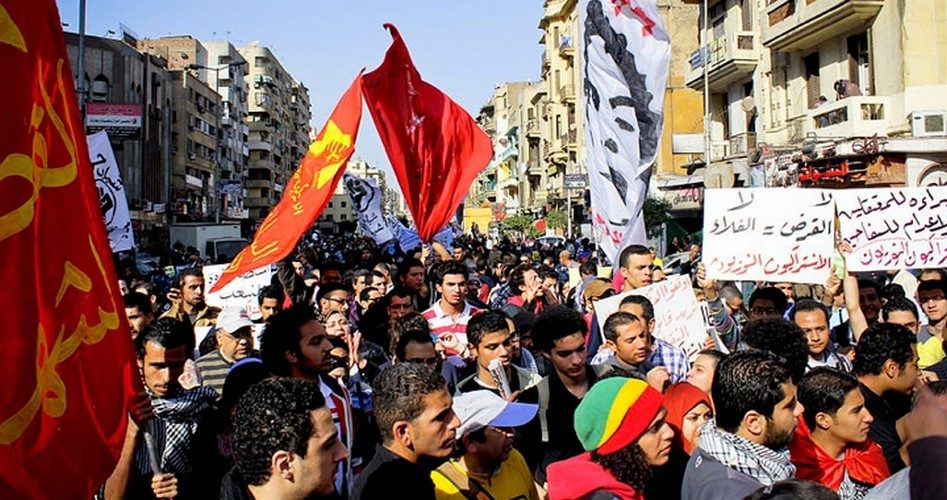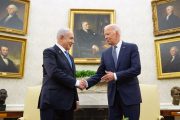
Egypt’s street protests (shown) — loosely based upon an online petition called the Tamarrud (loosely translated as “Rebellion”) — and the looming military threat of a coup against the freely elected government of Mohammad Morsi may have both had their origins in actions of the U.S. government.
The U.S. government has financed both NGO online activism and the Egyptian military in recent years, leading to the possibility that the U.S. government could have manufactured a pincer movement against Egypt’s elected government, creating “pressure from above” and “pressure from below.”
Pressure From Above
The Egyptian military issued an ultimatum to the Morsi government July 1 to restore order within 48 hours, threatening a coup d’etat. This is the same Egyptian military largely trained in America, as ably summarized in a recent Foreign Policy magazine post:
In fact, the Egyptian Army — as the entire military is colloquially known there — may be one of the U.S. government’s best friends in the entire Arab world. American presidents have been encouraging stability in the region for more than 30 years by making the Egyptian military the muscle behind a regional superpower — one built and trained by Washington…. Egypt’s current defense chief, Abdel Fattah al-Sisi, is an alum of the U.S. Army War College in Pennsylvania while the head of Egypt’s air force, Reda Mahmoud Hafez Mohamed, did a tour in the United States as a liaison officer, and the recently retired head of the Egyptian navy, Mohab Mamish, did a bunch of tours in the United States. Their cases are hardly unique; more than 500 Egyptian military officers train at American military graduate schools every year. There’s even a special guesthouse on T Street in northwest Washington, D.C., where visiting Egyptian military officials stay when in the American capital…. All this gives the United States quite a bit of leverage when it comes to the Egyptian military, one of the most powerful forces in Egyptian society. (Some estimate that up to 40 percent of the Egyptian economy is controlled by the military.)
If a military-style coup against elected officials occurs in Egypt, it will be led by — and take place with — U.S.-trained soldiers. And it may even be accomplished on the orders of U.S. military officials. Egyptian military’s ultimatum was issued just hours after a conference call with top U.S. Pentagon officials, according to the July 2 Wall Street Journal. “Gen. Martin Dempsey, the chairman of the U.S. military’s Joint Chiefs of Staff, spoke Monday with Egypt’s chief of defense. ‘It was a personal conversation between two chiefs of defense,’ a Pentagon official said, declining to provide any further information. Defense Secretary Chuck Hagel on Tuesday reached out to Gen. Al Sisi to convey U.S. concerns, current and former officials said.” The Wall Street Journal story noted: “The Obama administration is communicating using Pentagon channels because of long-standing ties between the U.S. and Egyptian militaries, current and former officials said. Washington has significant leverage with the Egyptian military, which depends on American aid and equipment. Many top Egyptian commanders have trained in the U.S., cementing relations.”
The timing of the ultimatum is suspicious at best, and the possibility of a U.S.-backed coup recalls some of the worst episodes of U.S. foreign policy. The U.S. government backed Egyptian dictator Hosni Mubarak for decades with military aid, and has repeatedly backed military coups against elected foreign leaders it did not like, including Mosaddegh in Iran (1953), Arbenz in Guatemala (1954), Allende in Chile (1973), and many others.
The U.S. government has had policy disputes with the Morsi government, which has continued to enforce laws banning blasphemy and laws against insulting the government, which, though they were also enforced under the Mubarak regime, continue to be enforced under Morsi’s Muslim Brotherhood. Many fear it will be more broadly enforced if the Brotherhood is allowed to consolidate power and extend Islamic sharia law.
Not surprisingly, the Muslim Brotherhood has not taken kindly to the threat of a military coup. The Muslim Brotherhood’s political party, the Freedom and Justice Party (FJP), rejected the military’s threats in a July 2 statement: “Only the Egyptian people have the right to draw a roadmap for the homeland’s future, through the Constitution passed only a few months ago by nearly two-thirds of the population. It is certainly unacceptable that any party, authority or institution should assume the right to draw a roadmap for the future of the homeland different from that already approved by the people.” The FJP stressed, “The role of the army, in all democratic states, is to protect the borders, face up to external threats, and maintain security. It does not interfere in the political scene — not even as an arbitrator, nor mediator. The arbitrator between political forces is the people, through the ballot box.”
The job of maintaining a stable government has become all-but-impossible for the FJP as their Islamist coalition partners have abandoned them and called for early elections. The salafist Al Nour Party — originally part of Morsi’s coalition in the Egyptian parliament and the second largest party in Egypt’s legislative body — has partnered with liberal and leftist groups to call for early presidential elections to “spare more bloodshed and to prevent the outbreak of civil war.” The Al Nour Party — regarded as more strongly Islamist than the Muslim Brotherhood’s FJP — claimed in a July 2 statement that “the ouster of the president is inevitable,” and may expect to gain a stronger position in the next government from early elections.
Meanwhile, chaos in the streets of Egypt has proven Morsi is unable to prevent even the leaders of his own party from being attacked by both protesters and police. News outlets have documented attacks on Muslim Brotherhood offices and even police attacks on the homes of leaders of the Muslim Brotherhood. The overall murder rate in Egypt has tripled since the ouster of Mubarak, even before the current chaos.
The Egyptian political crisis has also been stoked by a moribund economy stuck in stagflation. London’s Guardian newspaper labeled it the worst economic crisis for the country since the 1930s, with inflation and unemployment averaging more than 10 percent each over the past few years. Morsi’s government has certainly engaged in poor economic management, engaging in massive deficit spending which has increased the government debt-to-GDP ratio to more than 70 percent, a high level for a developing nation.
Economic growth, a brisk five percent of GDP in 2011 as the revolution against Mubarak took place, has withered to 1-2 percent of GDP annually, not even enough to account for population growth. As a result of the unrest, increasing debt and fiscal irresponsibility, Standard & Poor’s has lowered the Egyptian government’s credit rating to CCC+, a junk bond rating.
Pressure From Below
Massive street demonstrations are rarely spontaneous, and Egypt’s current street demonstrations were clearly seeded with U.S. foreign aid money. U.S. Ambassador to Egypt Anne W. Patterson noted in her 2011 Senate confirmation hearing that “through our Middle East Partnership Initiative we’ve given out, I think, 35 grants since the unrest in Tahrir Square to small civil society organizations, and many of them in rural areas who are doing just what you say, trying to connect the people’s grievances with their political desires.”
And while the U.S. State Department claims that “Egyptian groups that apply for and receive grants from the United States are engaged in activities that are politically neutral [and] no funds are provided to political parties,” the focus of the Middle East Partnership Initiative (METI) has been online activism along the lines of what the Tamarrud movement has done in recent weeks. The State Department’s METI newsletter boasted last year:
The “Activism 2.0” project develops the capacity of more than 100 different Egyptian civil society organizations to utilize cyberspace as a venue for activism, advocacy, and advancing reforms…. MEPI is helping marginalized groups make their voices heard and participate more fully in public life. Non-governmental organizations (NGOs) are taking advantage of a more open environment to network and improve their collective impact through joint strategies and activities…. Social Action project is connecting youth-focused NGOs across the region with technologies that will help them engage with new audiences, expand the reach of their work, and build regional networks, while focusing on success stories to further inspire the use of innovative technology in Egypt.
And U.S.-instigated unrest has been also exported through the misnamed National Endowment for Democracy, which funds the International Republican Institute, National Democratic Institute, and Freedom House. According to the New York Times, “The Republican and Democratic institutes are loosely affiliated with the Republican and Democratic Parties. They were created by Congress and are financed through the National Endowment for Democracy, which was set up in 1983 to channel grants for promoting democracy in developing nations.
The National Endowment receives about $100 million annually from Congress. Freedom House also gets the bulk of its money from the American government, mainly from the State Department.” The International Republican Institute is headed by former State Department official Lorne Craner, and has been linked to fomenting coups d’etat in Haiti and Honduras.
The European foundation FRIDE noted in a study entitled “Foreign Funding in Egypt after the Revolution,” by Mohamed Elagati, that these U.S. government-funded organizations were among the biggest players in Egypt in recent years, despite an Egyptian government attempt to expel them from the country this year. “Important nongovernmental (including partly government-funded) sources include the Ford Foundation, Freedom House, and the Arab Human Rights Fund.
Moreover, a broad range of foreign NGOs provides technical assistance in supporting ‘political’ civil society. These include notably the National Democratic Institute (NDI), the International Republican Institute (IRI), and German political party foundations, including the Friedrich Ebert Foundation, the Friedrich Naumann Foundation, and the Konrad Adenauer Foundation.” Indeed, the Ford Foundation has also been active in fomenting activism in the region, seeding the region with millions in grants to promote social unrest.
It may be impossible at this point to calculate precisely the role of U.S. foreign aid on the growth of current street demonstrations in Egypt in the Internet-based Tamarrud movement, but the parallels in training Egypt’s NGO sector for social media activism, combined with a long history of U.S. government interference in Egypt’s internal affairs, makes for a strong circumstantial case that the Egyptian chaos was manufactured in the United States. And the intimate ties between the U.S. and Egyptian military make it very unlikely that the ultimatum threat was made without U.S. support, leading to the following question: Were both the Egyptian chaos and proposed remedy manufactured in the same U.S. foreign policy petri dish?



